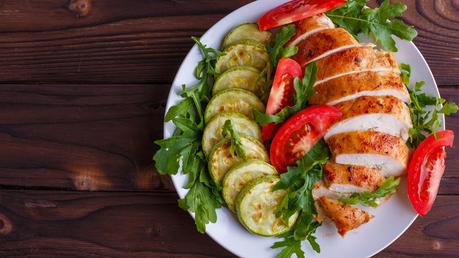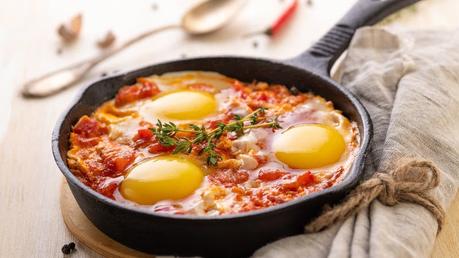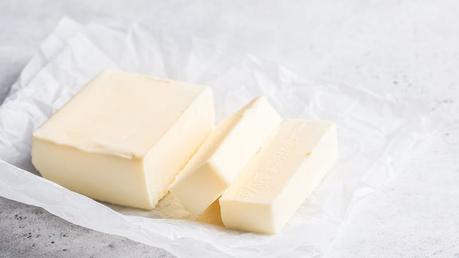Summary
Most experts agree that the average modern diet contains too many processed carbs, too much processed fat, and insufficient protein.
At Diet Doctor, we believe most people will benefit from lowering carbs and increasing protein. Regarding fats, most will also likely benefit from minimizing those that are highly processed, while freely eating the natural fat that comes along with whole-food proteins.
What is the key to long-term weight loss? It is maintaining a calorie deficit (burning more calories than you take in) in a sustainable way that leads to improvements in health and well-being.
While it sounds straightforward, it isn't always easy. For most people, losing weight isn't as simple as "trying harder" or having more willpower. This is because the most easily accessible foods are often high in calories, low in nutrition and - when loaded with carbs, fat, and sugar - somewhat addictive.
The temptation is often too much to ask anyone to resist.
Couple hyper-palatable food with your body's need to get adequate protein and nutrition, and you have the perfect set-up for overeating.
Fortunately, scientific research shows that increasing protein improves weight loss. The same goes for lowering carbohydrates.
But doing both together may be the most effective approach for many people. That would mean eating a range of 5 to 15% carbs, 25 to 35% protein, and 45 to 65% fat.

Get your personalized meal plan with a FREE 30-day trial!
Ideal macros for weight loss
When you lose weight, you want to make sure to do it in a healthy way.
This means mainly losing fat mass without losing much muscle mass. It also means preserving your resting metabolic rate, improving your metabolic health, and eating in a way you enjoy and can sustain long term.
But what are the best percentages of carbohydrate, fat, and protein - often called macronutrients or "macros" - to achieve healthy weight loss? High protein? Low carb? Low fat? High fat?
While each individual might find a different answer, many people will succeed with a high-protein, low-carb diet.
As stated above, that would mean a range of 5-15% carbs, 25-35% protein, and 45-65% fat (For an 1,800-calorie diet, that equates to around 20 to 70 g carbs, 110 to 160 g protein, and 90 to 130 grams fat).
What would this look like in terms of what food is on your plate? Here are three meals that fall into these ranges.
Although eating a high-protein, low-carb diet is not the only approach, it may be the best starting point. You can then monitor your hunger levels, food enjoyment, and healthy weight loss progress and adjust as needed.
Read on to understand why this is a successful combination for most people and how you can get started with healthy weight loss today.
Or, watch a summary of this guide in video

Get your personalized meal plan with a FREE 30-day trial!
What's your main health goal?
The worst foods for weight loss
Before we dig into what you should eat, let's start with the easy part - what you shouldn't eat. And when we say "easy," we mean easy to say, but oftentimes, harder to do.
You want to avoid high-calorie, low-nutrient foods - especially those that stimulate you to want to eat more. Most of these foods are ultra-processed and combine fat, starches, and sugar.
But they can also be ultra-processed fats, such as oils or cream, or carbs by themselves, and of course anything with added sugar or high fructose corn syrup like sugar-sweetened beverages.
Also, don't forget noncaloric sweeteners. If you are adding noncaloric sweeteners to coffee or tea, that is likely less concerning. But adding them to calorie-containing foods, like desserts or snacks, can lead to overeating.
High protein for weight loss
Protein may be the most critical macronutrient for weight loss. That may surprise some since much of the discussion around weight loss focuses on reducing carbs or fat.
Within the context of moderate and high-carb diets, increasing the amount of protein demonstrates improved weight loss and body composition.
Improved weight loss and body composition may explain why higher protein diets consistently result in better metabolic health and blood sugar control in people with and without diabetes.
Studies also show that higher protein diets promote satiety and decrease hunger better than lower protein diets.
In fact, most of the low-carb studies showing better weight loss and improved metabolic health are also higher protein studies. This means the study participants lowered their carbs and increased the percentage of protein in their diets. We will explain more about that in the low carb for weight loss section below.
Other reasons why protein may be beneficial for weight loss
- Protein leverage means that our bodies will seek out food and nutrition until we have reached our innate set point for protein intake. Based on the protein leverage hypothesis, eating low-protein foods means you'll overeat calories to get enough protein. Eating high-protein foods will do the opposite.
- Studies show that eating protein increases thermogenesis - the amount of energy required to digest and metabolize food. The energy required can be as high as 15% of total daily energy expenditure and is consistently higher with high-protein meals.
- Eating high-protein foods helps you avoid the energy-dense, nutrient-poor food that is so easy to overeat. Take a look at our guide to the top protein foods. You aren't going to find many processed, hyper-palatable foods. That's a win for protein!
Low carb for weight loss

Numerous studies show carbohydrate reduction results in significant weight loss, better than or equivalent to low-fat diets.
Why might a low-carb diet be more effective than low-fat for weight loss? With low carb, people limit hyper-palatable, high-carb foods, thereby lowering their insulin levels. They also tend to spontaneously reduce their calorie intake. But one often overlooked feature of these diets is that they also have higher protein percentages than do low-fat diets.
Low-carb RCTs are also higher protein RCTs
In 29 randomized trials lasting at least 3 months, which measured weight loss and glycemic control on a low-carb diet compared to a low-fat diet:
- None show low fat was better for weight loss or glucose control.
- Thirteen show combined lower carb AND higher protein were better than the control diet.
- Nine show lower carb and higher protein was equivalent to the control diet.
- Of the seven that controlled for equal protein:
- Three show no difference between low carb and the control diet.
- Four show a benefit to low carb. However, one didn't specify what participants ate, only what they were told to eat. So it is unclear if they complied or not. And another kept the protein very low at only 64 grams per day.
Because many of the above low-carb trials also increased the protein content of the intervention diet, we can't definitively say that carb reduction led to clinical benefits. Instead, we can say that a lower carb AND higher protein diet is usually better than the comparison diet.
You can read more about these 29 studies in our detailed guide.
One small randomized trial reported that increasing protein appears to have a greater impact on weight loss than carb reduction. However, more studies are required to draw a definitive conclusion.
Meal plans designed for results
With our personalized meal plans, we do the planning for you. All you have to focus on is cooking, eating, and enjoying healthy, delicious food.

Calories matter
Carbs and fat add calories to your diet. This is not a judgment; it is a fact. You need calories for energy, but you also must remain in a calorie deficit to lose weight.
The key is to find the eating pattern that provides adequate protein and nutrition while keeping you full and satisfied - with the fewest calories. For some, that will be low carb-high fat; for others, low carb-high protein; and still others, whole-foods high carb-low fat.
Summary
As we say at Diet Doctor, "calories count, but you don't have to count them." This means it's ideal if your eating pattern helps you naturally reduce calories, so you don't have to measure and calculate everything you eat.
Why carbs still matter
As most of the above-mentioned low-carb studies increased protein, does that mean carbs don't matter?
Of course not.
One small study compared a high-protein keto diet to a high-protein moderate carb diet and found better weight loss along with decreased hunger and calorie intake with the lower carb diet. This study suggests that the combination of higher protein and lower carbs might be the most effective approach.
And carbs definitely matter for those who find them easy to overeat or have a hard time controlling them. One study from Harvard reports a 60% carb diet had 43% increased activity in the brain's reward center compared to a 20% carb diet. The increased brain activity suggests that carbs can have strong addictive characteristics for some.
The combination of processed carbs and fats is most likely to stimulate your brain in a way that may cause you to overeat and crave more.
Low-carb diets can also lower insulin levels, which allows for easier access to burning fat stores. Although weight loss itself can lower insulin levels, low-carb diets likely have a more direct impact on insulin than do other diets.
Carbs are not "evil" for everyone
Despite evidence that low-carb diets are often better for weight loss and blood sugar control than low-fat diets, that doesn't mean carbs are harmful for everyone.
Observations from the Blue Zone populations - regions where people live into their 90s and 100s more often than the general population - show that specific populations can lead healthy lives while eating high-carb diets.
Carbohydrates also differ in their fiber content, glycemic index, glycemic load, and added sugar content. Eating a high-carb diet that is also low energy density, high fiber, and low sugar can work well for many people as long as they can enjoyably maintain that way of eating.
Summary
Carbs are energy. You may do well on a higher carb diet as long as you are insulin sensitive, you eat higher quality carbs, and don't overeat calories.
However, carbs can have addictive properties for some, and modern-day industrialized societies create an environment that promotes overeating carb-based foods. You may need to adjust your carb content to fit your overall lifestyle.
As numerous studies have shown, a low-carb, high-protein approach may be best for healthy weight loss for most people.
No time to cook?
No problem!
We understand how precious your time is. With personalized meal plans, we do the planning for you. All you have to focus on is simple cooking and enjoying delicious food.

What about fat for weight loss?

Let's dispel one myth right away. Eating fat does not by default make you fat.
Fat clearly plays a role in low-carb diets, hence the popular name: low-carb, high-fat (LCHF) diets. These diets have been shown to improve weight loss and blood sugar control.
When you reduce your caloric intake by cutting from 200-300 grams of carbs down to 20 grams, it's necessary to obtain energy elsewhere. That energy comes from fat - both the fat you eat and your body fat stores.
So, not only does replacing carbs with fat (and protein) not automatically make you fat, but it can also help you burn fat stores for energy, assuming that you eat fewer calories than you burn.
It is important to note, however, that in many low-carb trials, the absolute number of fat grams consumed usually stays the same or increases very slightly. This seems counterintuitive, but consider this example:
If you are eating 40% fat on a 2,000-calorie diet, you will eat 88 grams of fat. If you go on a low-carb diet with 60% fat and naturally reduce your caloric intake to 1,400 calories per day, you will be eating 93 grams of fat. That's an absolute increase of only 5 grams per day - hardly a dramatic difference worthy of the term "high fat."
Nonetheless, like carbs, fat is energy that can be over-consumed, leading to a calorie surplus and weight gain.
And, let's be honest: fat makes food taste better, which can prompt you to eat more than you initially intended.
So, when comparing fat versus carbohydrate as a source of calories, which is "better?" For many people, the answer may be fat.
Unlike carbs, fat does not directly cause an acute elevation of glucose or insulin. Because many overweight people are insulin resistant, a diet lower in carbs and higher in fat can be beneficial for improving glucose regulation.
In addition, after a low-carb adaptation period of a couple of weeks, insulin levels will likely be lower; remember that insulin promotes the storage of fat and prevents its breakdown. Therefore, a reduction in circulating insulin may allow the body to more efficiently access fat stores and burn them for energy.
But what about the long term? As long as you maintain a caloric deficit and are losing weight, or you stabilize at a healthy weight, there is no evidence that following a low-carb, high-fat diet worsens insulin resistance. In fact, it appears to do the opposite.
Summary
Fat can be a part of a healthy diet that helps with weight loss and metabolic health.
But, just like carbs, fat is energy that is easy to overeat.
Enjoy the fat that naturally comes with your food. Enjoy your ribeye steak or chicken thighs with skin. Sautee your veggies in butter or olive oil. Just be careful about purposefully adding extra butter, cream, or oils if they aren't needed for enjoyment.
The best macros for your weight loss
There isn't one best "diet" for everyone. We recommend finding a pattern of eating that is enjoyable, sustainable long-term, and that helps you lose weight in a healthy manner.
For many, the most successful dietary approach will be higher protein and lower carb. Although this is not the only method, it may be the best starting point.
Just remember, it may not matter what your macros are if you eat highly processed, low-nutrient foods, as these foods may drive you to overeat and sabotage your health progress. No matter what nutrition plan you choose, make sure you get adequate protein, adequate nutrition, and focus on high-quality, minimally processed foods.
Start your FREE 30-day trial!
Get instant access to healthy low-carb and keto meal plans, fast and easy recipes, weight loss advice from medical experts, and so much more. A healthier life starts now with your free trial!
Start FREE trial!

